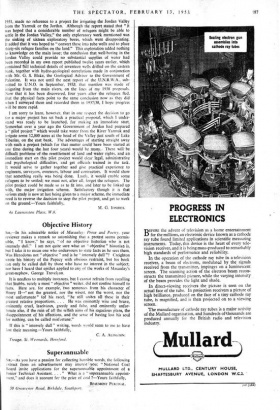Objective History
SIR,—In his admirable notice of Macaulay: Prose and Poetry. your reviewer makes a remark so astonishing that a protest seems permis- sible, " I know," he says, of no objective historian who is not intensely dull." I am not quite sure what an "objective " historian is, but I take it to mean one who endeavours to state facts as he sees them. Was Herodotus not " objective " and is he " intensely dull "? Creighton wrote his history of the Papacy with obvious restraint, but his book can only be called dull by those who- have no interest in the subject; nor have I beard that epithet applied to any of the works of Macaulay's great-nephew, George Trevelyan.
It is needless to multiply instances, but I cannot refrain from recalling that Stubbs, surely a most " objective " writer, did not confine himself to facts. Here are, for example, two sentences from his character of Henry II—" not the greatest, nor the wisest, nor the worst, nor the most unfortunate " (of his race), " be still unites all these in their greatest relative proportions. . . . He was eminently wise and brave, eminently cruel, lascivious, greedy and false, and eminently unfor- tunate also, if the ruin of all the selfish aims of his sagacious plans, the disappointment of his affections, and the sense of having lost his soul for nothing, can be called misfortune."
Treago, St. Weonards, Hereford.
C. A. ALINGTON.


































 Previous page
Previous page